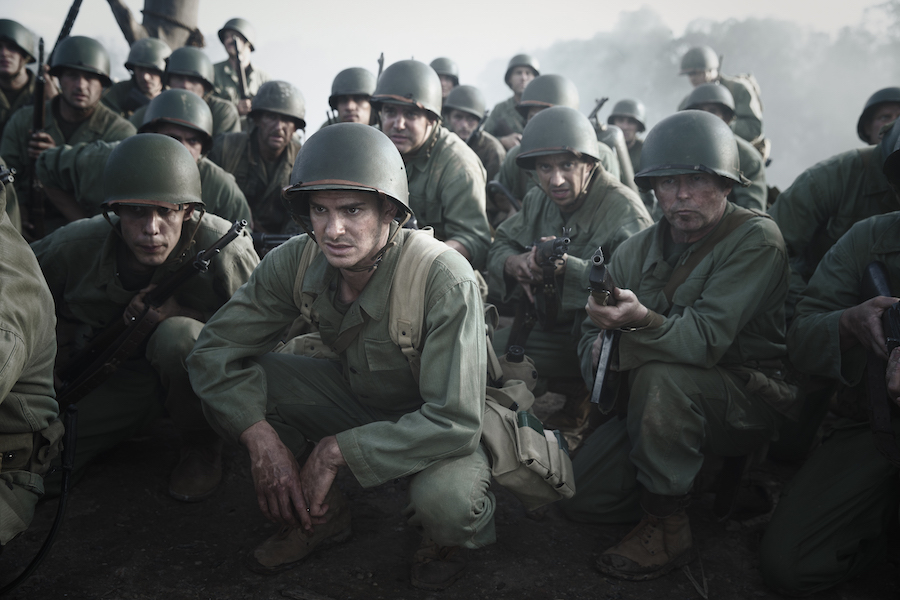‘Hacksaw Ridge’ Mel Gibson’s “Hacksaw Ridge” opens on a shot of bloody corpses. Over top this heinous image we can hear eight, whispered, earnest words: “Have you not heard? The lord is God.” That’s “Hacksaw Ridge” in a nutshell, and that’s Mel Gibson in a nutshell, too. The first movie he’s directed in 10 years, released into a world that has far from forgiven him, is nothing if not direct with us. Its opening all but says, “This is what I am: a movie both religiously pious and so violent you might vomit in your mouth 20 times. Accept me.” Accepting “Hacksaw Ridge,” much less Gibson, isn’t easy. But you have to respect it. After all, it’s just being honest. “Hacksaw Ridge,” however, is not the story of Mel Gibson. It’s the true story of Desmond Doss (Andrew Garfield), a man Gibson wishes he could be. A good ol’ boy Seventh Day Adventist, Doss doesn’t drink, he saved himself for marriage and he couldn’t hurt a fly, perhaps literally. He’s a longtime pacifist, but when World War II rears its head, Doss feels he couldn’t live with himself if his refusal to literally take up arms kept him from participating. His enlistment into the army as a “conscientious cooperator” (read: unarmed medic) leads to first confusion, then abuse by officers and fellow cadets alike, who think him a coward, an idiot or both. Still, Doss never wavers, and when his infantry winds up at the gruesome Battle of Okinawa, his special brand of persistence and foolhardiness ends with him saving over 70 wounded soldiers. RELATED: Interview: Luke Bracey on “Hacksaw Ridge” and Mel Gibson’s funny side Fitting for a film made by someone long out of the game, “Hacksaw Ridge” is a throwback, which in this case means to a type of film that was still popular only seven or eight years ago. Gibson has made a straight-up, happily simplistic husk of “old-fashioned” inspirational corn — a true story in which we root for a beleaguered hero against hissable monsters, then cheer as he prevails. Once Doss and company wind up overseas, Gibson segues into another kind of bygone movie: the WWII sagas of the late ’90s. Specifically, he wants to out-“Saving Private Ryan” “Saving Private Ryan,” taking that one’s gruesome Normandy opener and stretching it into a full hour-plus of blown-off limbs, caved-in heads, screaming soldiers on fire, even loving close-ups of rats gnawing on flesh. This is every bit the pacifist story one would expect from someone whose Jesus movie would have gotten an NC-17 if it wasn’t about Jesus. It’s also a film only Mel Gibson, and no one else, could have made. It bears all his obsessions and his contradictions. It’s the story of a man persecuted for his beliefs, made by someone persecuted, he believes, for his, as well as the things he said when he was drunk or simply very, very angry. It doesn’t think twice about giving Doss a Christ-like send-off during the closer, but it also wallows in a Boschian hellscape like some sick gorehound, offering elegant and beautifully choreographed visions of the worst things you’ve ever seen. Predictably, given how the Jews fared in “The Passion of the Christ,” Gibson doesn’t tread carefully around how to depict the Japanese forces. They’re shown as monstrous Others — boogeymen, the soldiers tell each other, prone to blow themselves up for the empire and target medics to amp up the body count. But sometimes Gibson will show a more diplomatic side. The Japanese soldiers suffer as monstrously and disgustingly as their targets. He even juxtaposes Doss mooning over his lost Bible with the defeated adversaries soberly preparing seppuku. Bloody Mel’s a complicated guy, and pretty weird: He still loves cheesy slow-mo (sometimes during spoken dialogue), and he’ll throw in bizarre touches, like a meet-cute between Doss and his goodly to-be-wife (Theresa Palmer) in a hospital over a blood transfusion. “Hacksaw Ridge” is moving and revolting, old school masterful and deeply odd, jingoistic and respectful of other cultures, enlightened and deeply messed-up. It can be all these things because Mel Gibson is all these things. It is what it is, and if you don’t leave liking its maker as a human being, at least you understand him.
Director: Mel Gibson
Stars: Andrew Garfield, Sam Worthington
Rating: R
3 (out of 5) Globes
‘Hacksaw Ridge’ is Mel Gibson’s ultraviolent film about a pacifist

Mark Rogers
Follow Matt Prigge on Twitter @mattprigge















